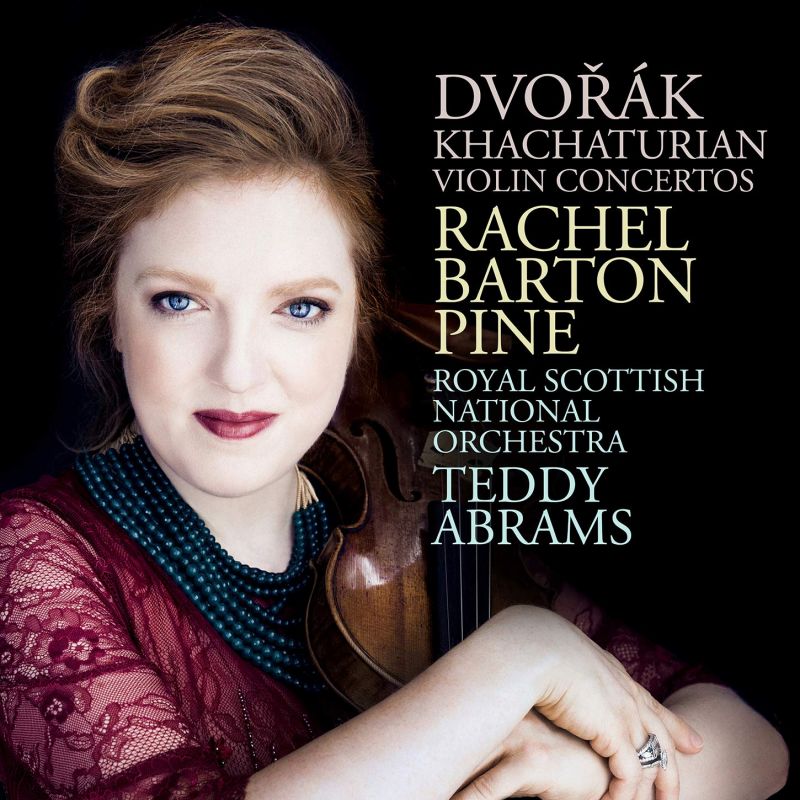DVORÁK; KHACHATURIAN Violin Concertos (Rachel Barton Pine)
View record and artist detailsRecord and Artist Details
Composer or Director: Teddy Abrams, Aram Il'yich Khachaturian, Rachel Barton Pine, Antonín Dvořák
Genre:
Orchestral
Label: Avie
Magazine Review Date: 01/2020
Media Format: CD or Download
Media Runtime: 73
Mastering:
DDD
Catalogue Number: AV2411

Tracks:
| Composition | Artist Credit |
|---|---|
| Concerto for Violin and Orchestra |
Antonín Dvořák, Composer
Antonín Dvořák, Composer Rachel Barton Pine, Composer Royal Scottish National Orchestra Teddy Abrams, Composer |
Author: Andrew Farach-Colton
I wasn’t expecting Rachel Barton Pine to be such a persuasive advocate for Khachaturian’s much-maligned Violin Concerto. She’s not a flashy player, and – let’s face it – this is one of the flashiest of concertos. Instead, her success here comes from purely her musicianship, which is utterly unaffected. There are no virtuoso tricks, no swooping, swooning or mooning; she just plays it honestly. Yet unlike, say, James Ehnes (Onyx, 7/14), who takes a rather serious view, Pine seems to be having quite a lot of fun. The first movement is high-spirited, and she proves herself to be an expert storyteller, particularly in the expansive cadenza (she chooses David Oistrakh’s extended solo over the composer’s own), where she carries the narrative forwards with assurance without skimping on colourful detail. There’s a Sheherazade-like character to her playing of the slow movement, too, with its easy balance of strength and vulnerability. Although her tone is more wiry than silky, she conveys an alluring intimacy – try starting around 8'10" for an especially moving example. And she handles the intricate figuration of the boisterous finale with aplomb, holding fast to the basic tempo while phrasing patiently in long, eloquently phrased paragraphs.
These same unimpeachable qualities imbue Pine’s performance of Dvořák’s A minor Concerto. I love how she emphasises the constant pull towards the lyrical in the opening Allegro ma non troppo, so that emphatic gestures nearly always seem to culminate inwards. This is, after all, how the movement itself ends, melting into the Adagio ma non troppo, and the violinist makes the transitional passage at 10'29" (marked Quasi moderato) memorably soulful. I do occasionally long for the tonal twang and rhythmic flair of the Czech Philharmonic under Ančerl in the classic recording with Josef Suk (Supraphon, 5/62), especially in the rollicking finale, but in general the Royal Scottish National Orchestra play with rhythmic vitality and expressive warmth under Teddy Abrams’s direction – and they dig into the Khachaturian with real gusto, too. Very warmly recommended.
Discover the world's largest classical music catalogue with Presto Music.

Gramophone Digital Club
- Digital Edition
- Digital Archive
- Reviews Database
- Full website access
From £8.75 / month
Subscribe
Gramophone Full Club
- Print Edition
- Digital Edition
- Digital Archive
- Reviews Database
- Full website access
From £11.00 / month
Subscribe
If you are a library, university or other organisation that would be interested in an institutional subscription to Gramophone please click here for further information.




